The Federal Trade Commission (FTC) has initiated a comprehensive refund program to compensate consumers who purchased the Razer Zephyr air purifier mask, a product falsely advertised as offering N95-equivalent protection during the height of the COVID-19 pandemic. This action stems from a lawsuit filed by the FTC against Razer, a company known for its gaming and lifestyle products, for misleading consumers about the Zephyr mask’s protective capabilities. The FTC alleges that Razer marketed the Zephyr mask as providing N95-level filtration, a claim that violated federal regulations as the mask had not undergone the necessary certification process. The total refund amount disbursed by the FTC reaches $1.1 million, fully reimbursing all 6,764 identified purchasers of the flawed mask.
The crux of the FTC’s legal action against Razer centers on the company’s misrepresentation of the Zephyr mask’s filtration efficacy. N95 masks adhere to stringent governmental standards, requiring a tight facial fit and highly efficient filtration of airborne particles. Manufacturers seeking to designate their masks as N95 compliant must undergo a rigorous certification process. Despite submitting the Zephyr mask for certification, Razer never received the official N95 designation. However, the company proceeded to market the mask as offering N95-equivalent protection, a deceptive practice that prompted the FTC’s intervention.
Following the FTC’s investigation, Razer ultimately discontinued the sale of the Zephyr mask but continued to offer replacement filters, further compounding the issue. Eventually, Razer ceased all sales related to the Zephyr and initiated a partial refund process. However, the FTC’s lawsuit revealed that only a small percentage of affected consumers, approximately 6%, received reimbursement. The $1.1 million settlement secured by the FTC aims to rectify this shortfall by compensating the remaining 94% of customers who had not received their due refunds.
The FTC’s refund program aims to provide a median reimbursement of around $150 per customer, reflecting the original price of the Zephyr mask ($100) and the cost of replacement filters ($30). The disbursement process utilizes two primary methods: physical checks sent via mail and electronic payments through PayPal. Recipients of paper checks are required to cash them within 90 days, while those receiving PayPal payments have a 30-day window to accept the funds.
To ensure comprehensive coverage of eligible recipients, the FTC employed a multifaceted approach to identify all affected customers. As mandated by the court order, Razer provided a comprehensive list of Zephyr mask purchasers. Furthermore, the FTC leveraged its own resources, including the Consumer Sentinel Network database, to identify additional consumers who may have filed complaints related to the Zephyr mask. This thorough process ensured that the maximum number of affected customers were included in the refund program.
Consumers with questions or concerns regarding the refund process are encouraged to contact the FTC’s designated refund administrator, Simpluris, at a dedicated helpline. Alternatively, detailed information and answers to frequently asked questions can be found on the FTC’s official website, providing a readily accessible resource for those seeking further clarification. The FTC’s decisive action in this case underscores its commitment to protecting consumers from deceptive marketing practices and ensuring that they receive appropriate redress when companies fail to adhere to established standards and regulations.

